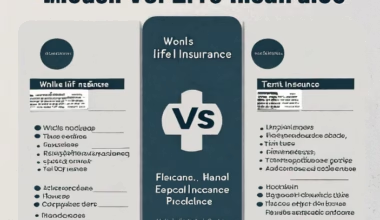Comparing Car Insurance Rates: A Complete Guide
Let’s face it: car insurance can be a bit overwhelming. With so many options and rates flying around, how do you find the best deal? In this guide, we’ll break down everything you need to know about comparing car insurance rates, helping you make an informed decision that suits your needs and budget. Buckle up!
Understanding Car Insurance
What is Car Insurance?
Car insurance is a contract between you and an insurance company that provides financial protection in case of accidents, theft, or damage to your vehicle. In exchange for paying premiums, the insurer agrees to cover certain costs associated with accidents or damages, giving you peace of mind on the road.
Why is Car Insurance Important?
Think of car insurance as your safety net. Accidents can happen to anyone, and the costs associated with them can be staggering. Having insurance ensures that you won’t be left footing the bill for repairs or medical expenses, which can easily reach into the thousands.
Types of Car Insurance Coverage
Liability Coverage
This is the most basic type of car insurance and is required in most states. Liability coverage helps pay for damages and medical expenses if you’re at fault in an accident. It’s like a protective barrier—if you mess up, it cushions the blow!
[ninja_table_builder id=”168″]Collision Coverage
Collision coverage kicks in if you hit another vehicle or object, covering repairs to your car regardless of who’s at fault. Imagine being able to get your car fixed without the stress of worrying about the costs—that’s the beauty of collision coverage.
Comprehensive Coverage
Comprehensive coverage protects against non-collision incidents, such as theft, vandalism, or natural disasters. If a tree falls on your car during a storm, this coverage has your back!
Additional Coverage Options
There are various add-ons you can consider, like roadside assistance, rental car reimbursement, and gap insurance, which covers the difference between your car’s value and what you owe on it. These extras can provide additional peace of mind, especially if you’re frequently on the road.
Factors That Affect Car Insurance Rates

Personal Factors
Age and Gender
Insurance companies often consider your age and gender when determining rates. Statistically, younger drivers and male drivers tend to be riskier, which can lead to higher premiums. Think of it as being part of a group—some groups simply have more claims than others!
Driving Record
Your driving history plays a significant role in your insurance rate. A clean record with no accidents or violations can help you snag lower rates, while a history of accidents can drive your rates up. It’s like a report card for drivers—grades matter!
Credit Score
Believe it or not, your credit score can impact your car insurance rates. Insurers often view a higher credit score as an indicator of responsibility, which can lead to better rates. It’s just one more reason to keep your financial house in order!
Vehicle Factors
[ninja_table_builder id=”161″]Make and Model
The type of car you drive significantly affects your insurance rate. Luxury cars and sports models typically come with higher premiums because they cost more to repair or replace. It’s a bit like buying a fancy coffee—sometimes you pay for the brand!
Safety Features
Cars equipped with advanced safety features, like anti-lock brakes and airbags, can qualify for discounts. The safer your vehicle, the less risk the insurer takes on, which can mean savings for you.
Geographic Factors
Location and Traffic Conditions
Where you live can greatly impact your car insurance rates. Urban areas with heavy traffic and high accident rates often result in higher premiums compared to rural areas. Think about it: the busier the roads, the higher the chances of an accident!
How to Compare Car Insurance Rates

Gather Your Information
Before you start comparing rates, gather all relevant information. This includes your vehicle details, driving history, and personal information. The more accurate your information, the better the quotes you’ll receive.
Use Comparison Websites
Take advantage of online comparison tools that allow you to enter your information and get quotes from multiple insurers at once. It’s like window shopping without leaving your couch!
Contact Insurance Agents
Don’t hesitate to reach out to insurance agents for personalized quotes. They can provide insights into different policies and help you understand your options. Sometimes, talking to a human can clear up confusion faster than reading fine print!
[ninja_table_builder id=”155″]Review Discounts and Offers
Many insurers offer various discounts, such as for bundling policies or maintaining a good driving record. Make sure to ask about these to maximize your savings. After all, every little bit helps!
Tips for Finding the Best Rates
Increase Your Deductible
Opting for a higher deductible can lower your premiums. Just be sure you’re comfortable with the amount you’ll have to pay out-of-pocket in case of a claim. It’s like choosing to pay less now, but potentially more later.
Bundle Policies
If you have home insurance or other policies, consider bundling them with your car insurance for a discount. Insurers love it when you bring more business their way, so they’ll often reward you for it.
Maintain a Clean Driving Record
Keeping your driving record clean is one of the best ways to ensure lower rates. Avoid accidents and traffic violations, and over time, your insurer may reward you with reduced premiums. It’s a win-win situation!
The Role of Reviews and Ratings
Understanding Insurance Ratings
Insurance companies are rated by independent agencies based on their financial strength and claims-paying ability. Look for companies with high ratings to ensure they can meet their obligations when it counts.
How to Read Customer Reviews
Customer reviews can provide valuable insights into an insurer’s service quality. Pay attention to feedback regarding claims processing, customer support, and overall satisfaction. Remember, if a company has a lot of unhappy customers, that’s a red flag!
Common Myths About Car Insurance

Myth 1: Red Cars are More Expensive to Insure
This is a common misconception! The color of your car has no bearing on insurance rates. What matters more are factors like the car’s make, model, and safety features. So, feel free to paint your car red if you love the color!
Myth 2: You Should Always Choose the Cheapest Option
While it’s tempting to go for the lowest rate, the cheapest option isn’t always the best. Ensure you’re getting adequate coverage that meets your needs. Sometimes, a slightly higher premium can mean much better coverage.
[ninja_table_builder id=”146″]Conclusion
Comparing car insurance rates doesn’t have to be a daunting task. By understanding the different types of coverage, factors that influence rates, and how to effectively compare options, you’ll be well-equipped to find the right policy for your needs. Remember, the goal is not just to save money, but to ensure you have the coverage that keeps you protected on the road.
FAQs
How often should I compare car insurance rates?
It’s wise to compare rates at least once a year or whenever you experience a significant life change, like moving or buying a new car.
Can I change my car insurance provider anytime?
Yes, you can switch providers at any time. Just make sure to have your new policy in place before canceling your current one to avoid a lapse in coverage.
What should I do if I get into an accident?
If you’re in an accident, ensure everyone is safe, exchange information with the other driver, and report the incident to your insurance company as soon as possible.
Are there penalties for switching insurance companies?
Generally, there are no penalties for switching. However, check with your current provider to ensure you’re not on the hook for any unpaid premiums.
How do I know if I have enough coverage?
Consider your financial situation, potential liabilities, and the value of your assets. Consulting with an insurance agent can also help you determine the appropriate coverage for your needs.
Now that you’re equipped with all this knowledge, you’re ready to dive into the world of car insurance with confidence! Happy comparing!
[ninja_table_builder id=”154″]






